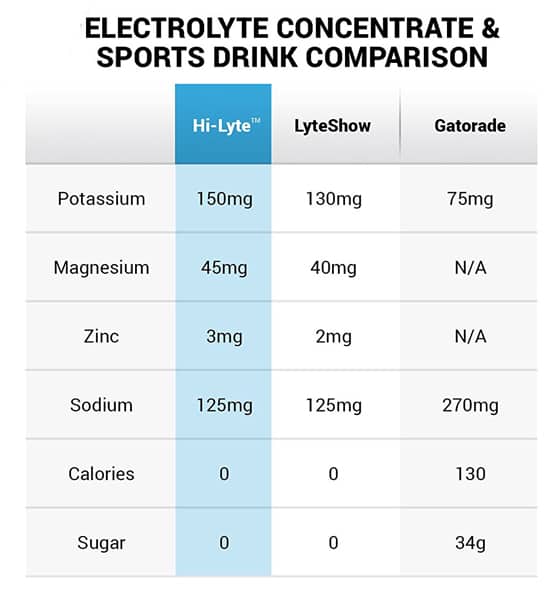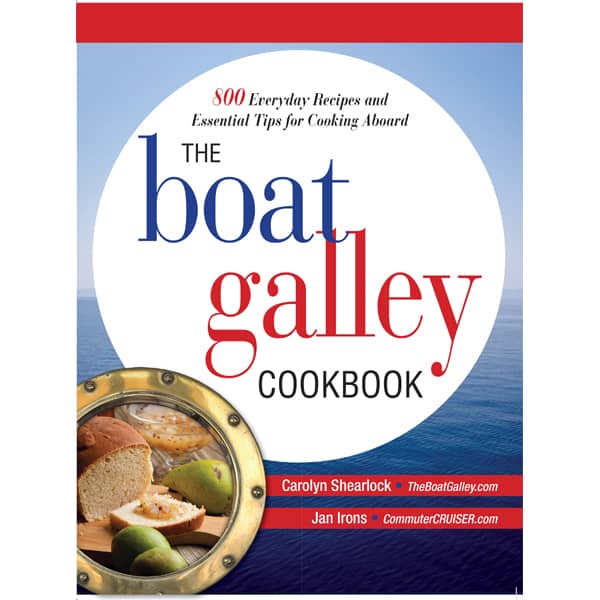Electrolyte replacement is an issue that comes up over and over amongst boaters in general, and even more so among cruisers. Many of us are specifically looking for a sugar-free electrolyte replacement, whether for calories or being diabetic.
Sweat and seasickness can rob your body of necessary electrolytes, and if you are eating less processed food you very well may not be putting enough back in your body. The best-known electrolyte is sodium (and the one that less processed food really cuts down on) but potassium, magnesium and zinc are also important for avoiding muscle cramps, thinking clearly and just plain feeling good.
You can buy packets of rehydration powder or drink Gatorade, or make your own rehydration solution.
Cruising without air conditioning and working/walking outside in a hot climate, Dave and I have always found that we periodically (sometimes daily!) needed rehydration drinks. Dave tends to go for Gatorade, buying the powder to save space and weight.
There are two problems with Gatorade and the other rehydration solutions we’ve used in the past:
- Most only contain sodium and potassium (some don’t even have potassium), not magnesium or zinc.
- They’re heavy on sugar, along with artificial flavorings and colors that can bother some people.
The sugar (and some alternative sweeteners) is a big problem for diabetics, those with prediabetes, and others who prefer a low carb diet. And many diabetics need more potassium, magnesium and zinc. So the traditional rehydration products aren’t a good match.
I actually found two products, which are very similar: Hi-Lyte Electrolyte Concentrate and LyteShow Electrolyte Concentrate (links to Amazon). Neither one has any flavoring, sugar or other sweeteners, or color. Just the stuff your body needs!
Both are a concentrated liquid that you add to water. A single small bottle (4 ounces — 1/2 cup) will provide electrolyte for 48 quarts with Hi-Lyte or 40 quarts with LyteShow. Neither one has to be refrigerated before or after opening — and they have a 2-year shelf life!
I’ve tried both and they impart a very small taste to water. I don’t find it objectionable, but if you don’t like it, a bit of lemon or lime juice in the water makes it totally undetectable (or put it in your coffee water). I particularly like that there is no bright color to stain my clothes if a drop drips.
So why do I prefer Hi-Lyte to LyteShow? To be honest, there’s not much difference and I recommend both. But Hi-Lyte does have three tiny advantages: it has slightly higher levels of electrolytes, it’s slightly more concentrated so that the same size bottle can treat 8 more quarts of water, and it is (typically — depending on sales) a little cheaper per serving.

The only place I’ve found to consistently buy both of these is on Amazon:

Carolyn Shearlock has lived aboard full-time for 17 years, splitting her time between a Tayana 37 monohull and a Gemini 105 catamaran. She’s cruised over 14,000 miles, from Pacific Mexico and Central America to Florida and the Bahamas, gaining firsthand experience with the joys and challenges of life on the water.
Through The Boat Galley, Carolyn has helped thousands of people explore, prepare for, and enjoy life afloat. She shares her expertise as an instructor at Cruisers University, in leading boating publications, and through her bestselling book, The Boat Galley Cookbook. She is passionate about helping others embark on their liveaboard journey—making life on the water simpler, safer, and more enjoyable.
Simplify meal prep on board with proven strategies for provisioning, maximizing fridge space, and cooking delicious meals aboard your boat.










Tami Steel says
Also check out Nuun. They are tablets, so easy to store on the boat. Full of good stuff, but no sugar. Some varieties have a tiny bit of sugar (which distance athletes need a bit of), so just double check that you order the electrolytes and they have no sugar.
Dave Skolnick (S/V Auspicious) says
Hi Carolyn,
Do you have any footnotes to credible medical sources without conflicts of interest? Extra credit for CDC or NIH! *grin* I’m predisposed to agree with you but I’m not a medical professional and I try to avoid conventional wisdom not grounded in science.
best of the season, dave
Carolyn Shearlock says
I’m not sure what you’re asking for — the need for electrolytes? Connection between electrolytes and cramping, etc.? Need for electrolytes without sugar? All have been discussed by various medical professionals I’ve worked with through the years, as well as first aid classes and so on.
Dave Skolnick (S/V Auspicious) says
I’m thinking mostly in terms of the real value of drinks that are promoted as replenishing electrolytes. Real science or fluff?
Dave Skolnick (S/V Auspicious) says
Did some quick searching. Most of the material returned is from content mills and non-scientific media. I found one interesting source:
NIH has this – https://www.ncbi.nlm.nih.gov/books/NBK234935/
It is interesting to note that there is a lot of smoke and little fire. Only two truly credible sources in the first ten pages of a response to a Google search.
My takeaway is that for those who are not intense athletes, which covers most cruisers even when sweating profusely (certainly one of my talents), vitamin and mineral (i.e. electrolyte) requirements are more than meant by a reasonably balanced diet. Drink water. I would say eat a banana but the science doesn’t seem to support the potassium urban myth; I’ll eat them anyway as I rather like bananas. If you need flavoring and your diet can stand extra sodium and carbohydrates (most people can really do without) then sports drinks are fine but plain water is as good or better.
If you’ve got credible footnotes to the contrary I’d be grateful. In the meantime, a balanced diet and two or three liters of water per day while aboard serve me well and have a basis in nutritional science.
Carolyn Shearlock says
If you’re not having cramps and headaches, that’s great. I do get cramps and thus have consulted my doctor who said that I needed electrolyte replacement. I think that much of it depends on whether you have symptoms, and personal needs for supplementation depend tremendously on what food is eaten. Not everyone needs a supplement — you’re obviously one of the lucky ones who does not. (BTW, my doctor isn’t a big fan of Gatorade or other sports drinks for giving a good mix of electrolytes — she is far more in favor of products that are sold for electrolyte replacement without all the sugar).
Dee Anderson says
Please remind people to check with their health care provider if they are on prescription medications that can result in potassium overload if electrolytes are consumed in too great amounts. More is not always better. Thanks
Beth says
What is the shelf life? Can I buy now for a cruise six months from now, or should I wait?
Carolyn Shearlock says
The bottles I’ve gotten have an expiration date approximately 2 years from when I’ve bought them, so I think you’d be fine.
Rick Nicholson says
I am on the Ideal Protein diet program, I’ve lost 115 pounds so far. The problem is as I have lost my weight, I’ve significantly upped my physical acrtivities, averaging 15,000 fitbit steps a day and doing various, but not a great deal, of strengthening exercises. So you’re weight for the problem right? The problem is that I started having night leg cramps continually. I tried upping my fluid intake, increased my magnesium and potassium (these supplements are part of the diet regime) and the cramps continued.
My coach recommended I start taking their Branch Amino Acid pack, powder added to water. When I began drinking this supplement, my leg cramps stopped.
Richard Teachout says
Unflavored Pedialyte was recommended by my Dr. for my consistent leg cramps during hot weather work (80 yr old Farrier working in 100 degree + temps with hi humidity). Worked great — a couple of sips during the day and plenty of water completely resolved my problems.
Carolyn Shearlock says
Yep! We use a variation that has no sugar since I was diagnosed diabetic, but for exactly the same reason in the tropics!